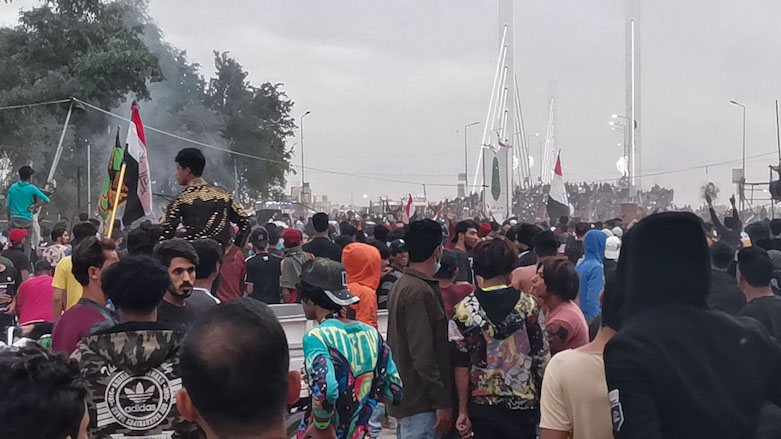Trump administration condemns attacks on peaceful protestors in Iraq; Biden likely to respond similarly

WASHINGTON DC (Kurdistan 24) – The US embassy in Baghdad has strongly criticized the attacks on peaceful demonstrators in southern Iraq.
Late on Friday, armed supporters of the erratic, firebrand cleric, Muqtada al-Sadr assaulted liberal protestors involved in anti-government demonstrations in the southern city of Nasiriyah, Iraq’s fourth largest city and the capital of Dhi Qar Province.
The Sadrists’ attacks on the peaceful protestors resumed again on Saturday. In the two days of violence, some seven protestors were killed, while several others were wounded.
Read More: Protesters killed, wounded in southern Iraq by Sadr followers
The violence prompted a tweet from the US embassy on Saturday, condemning the violence and affirming, “These unjustifiable acts of violence have no place in a democracy.”
The United States condemns the violence against peaceful protestors that took place in Nasiriyah, Dhi Qar today. These unjustifiable acts of violence have no place in a democracy. 1/2
— U.S. Embassy Baghdad (@USEmbBaghdad) November 28, 2020
The US “joins the international community in calling for those responsible to be held accountable, and for the government to provide protection for protestors and others engaged in the legitimate exercise of free speech,” a second tweet added.
During the tenure of Secretary of State Mike Pompeo, the State Department has been much more actively engaged in calling on the Iraqi government, in a variety of ways, to fulfill its responsibilities—whether to protect diplomatic facilities or to respect the rights of its citizens.
Under the administration of Barack Obama, who, as a senator had opposed the 2003 Iraq war, the US tendency was to defer to the actions of the Baghdad government in the name of respecting the country’s sovereignty. That continued under Pompeo’s predecessor, Rex Tillerson.
But “the Trump team, under Pompeo, has been far more proactive in signaling to Baghdad that civil society is an important aspect of competition with Iran,” Nicholas Heras, of Washington’s Institute for the Study of War, told Kurdistan 24.
Moreover, that is likely to continue with the next administration.
“There is no set Biden team approach to Iraq yet,” Heras added, “but concern for a free Iraqi civil society is likely to carry over from Pompeo to Antony Blinken,” whom President-elect Joe Biden has named to become his Secretary of State.
Read More: Biden presents national security team, as US presidential transition begins
Iraq’s current prime minister, Mustafa al-Kadhimi, is the first person to hold that post who does not come from a Shia Islamic Party, since Iraqi elections began following Saddam Hussein’s overthrow. The US, or at least the administration of Donald Trump, appears to have developed a significantly warmer relationship with Kadhimi than with his predecessors.
Indeed, the renowned investigative journalist, Bob Woodward, recounted a story of how Trump mocked his first National Security Adviser, Gen. H.R. McMaster, following former Iraqi prime minister Haider al-Abadi’s 2017 visit to Washington.
“The president puffed up his chest and started noticeably exaggerated breathing,” imitating McMaster, Woodward wrote. Then Trump “said in loud staccato, ‘I know the [prime minister] of Iraq. He’s a good man, sir! I know he has our best interest at heart.’”
“Returning to his normal voice, Trump said, ‘That guy’s just full of shit. I met this guy. McMaster doesn’t know what he’s talking about,’” Woodward’s telling anecdote concluded.
Sadr Maneuvering in Advance of Next Elections
Iraq has been roiled by political protests since October 2019. They prompted the resignation of the previous prime minister, Adil Abdul Mahdi, and Kadhimi has promised that Iraq’s next parliamentary elections will be held a year early—in June 2021.
They will also be held under a new electoral system. The previous system had a clear flaw. In fact, it is remarkable that it could have emerged under US tutelage.
The US electoral system is structured to make political representatives accountable to the people. Thus, representatives run as individuals. If they don’t serve the people, they get voted out in the next election.
But when Iraq’s electoral law was drawn up—under the George W. Bush administration—it was stipulated that representatives would run on “lists” and people would vote, province-wide, for a list.
The result was that no single individual was ever responsible. No one individual could ever be held accountable by the people. The result was one of the world’s most corrupt regimes: Iraq ranks 162 out of 180 on Transparency International’s corruption list.
The system also promoted sectarian politics, exacerbating the sectarian divides that have plagued Iraq since the country’s founding under British colonial rule after World War I.
The new electoral law, passed by parliament earlier this month, provides for candidates to run as individuals to represent districts—one of the basic demands of the protestors.
On Friday, thousands of Sadr’s supporters also gathered in Baghdad’s Tahrir Square, as well as the southern cities of al-Hillah and Basra.
Sadr had earlier tweeted about the upcoming elections, saying he expected a major win and wanted, for the first time, that Iraq’s next prime minister be a Sadrist.
Sadr’s supporters responded and thousands “stood unmasked” in Baghdad’s Tahrir Square, “chanting: ‘Yes, yes for our leader,’” Al-Jazeera reported, noting that Iraq also remains at high-risk for the coronavirus. “The crowd then stood side-by-side for Friday prayers at noon,” it added.
It is generally understood that Sadr is mobilizing his base and flexing his political muscle in advance of the June elections with the large Friday gatherings, and even with his supporters’ attacks on liberal, political demonstrators.
Sadrists once supported them, but switched to opposing them early this year, following a visit to Iran.
Editing by Karzan Sulaivany
